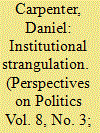|
|
|
Sort Order |
|
|
|
Items / Page
|
|
|
|
|
|
|
| Srl | Item |
| 1 |
ID:
099314


|
|
|
|
|
| Publication |
2010.
|
| Summary/Abstract |
The politics of financial reform represent a genuine test case for American politics and its institutions. The Obama administration's proposed reforms pit common (largely unorganized) interests against well-organized and wealthy minority interests. I describe how the withering and unfolding of financial reform has occurred not through open institutional opposition but through a quieter process that I call institutional strangulation. Institutional strangulation consists of much more than the stoppage of policies by aggregation of veto points as designed in the US Constitution. In the case of financial reform, it has non-constitutional veto points, including committee politics and cultural veto points (gender and professional finance), strategies of partisan intransigence, and perhaps most significantly, the bureaucratic politics of turf and reputation. These patterns can weaken common-interest reforms, especially in the broad arena of consumer protection.
|
|
|
|
|
|
|
|
|
|
|
|
|
|
|
|
| 2 |
ID:
149368


|
|
|
|
|
| Summary/Abstract |
Why do petitions flourish when they are often denied if not ignored by the sovereigns who receive them? When activists seek to build political organizations in network-rich but information-poor environments, petitioning as institutional technology facilitates recruitment. A petition’s signatory list identifies and locates individuals sympathetic to its prayer and expresses to other citizens who and how many agree with the prayer. Three historical moments—the explosion of antislavery petitioning in the antebellum United States, the emergence of Protestantism in sixteenth-century France, and England’s suppression of petitioning after the Restoration Settlement of 1660—provide vivid demonstrations of the theory. A recruitment-based theory implies that petition drives mobilize as much as they express, that well-established groups and parties petition less frequently, and that the most important readers of a petition are those asked to sign it. The petition’s recruitment function complements, but also transforms, its function of messaging the sovereign. Contemporary digital petitioning both routinizes and takes its force from the petition’s embedded recruitment technology.
|
|
|
|
|
|
|
|
|
|
|
|
|
|
|
|
| 3 |
ID:
150509


|
|
|
|
|
| Summary/Abstract |
Native Americans have been structurally excluded from the discipline of political science in the continental United States, as has Native epistemology and political issues. I analyze the reasons for these erasures and elisions, noting the combined effects of rejecting Native scholars, political issues, analysis, and texts. I describe how these arise from presumptions inherent to the disciplinary practices of U.S. political science, and suggest a set of alternative formulations that could expand our understanding of politics, including attention to other forms of law, constitutions, relationships to the environment, sovereignty, collective decision-making, U.S. history, and majoritarianism.
|
|
|
|
|
|
|
|
|
|
|
|
|
|
|
|
| 4 |
ID:
133942


|
|
|
|
|
| Publication |
2014.
|
| Summary/Abstract |
Examining an original dataset of more than 8,500 antislavery petitions sent to Congress (1833-1845), we argue that American women's petition canvassing conferred skills and contacts that empowered their later activism. We find that women canvassers gathered 50% or more signatures (absolute and per capita) than men while circulating the same petition requests in the same locales. Supplementary evidence (mainly qualitative) points to women's persuasive capacity and network building as the most plausible mechanisms for this increased efficacy. We then present evidence that leaders in the women's rights and reform campaigns of the nineteenth century were previously active in antislavery canvassing. Pivotal signers of the Seneca Falls Declaration were antislavery petition canvassers, and in an independent sample of post-Civil War activists, women were four times more likely than men to have served as identifiable antislavery canvassers. For American women, petition canvassing-with its patterns of persuasion and networking-shaped legacies in political argument, network formation, and organizing.
|
|
|
|
|
|
|
|
|
|
|
|
|
|
|
|
|
|
|
|
|